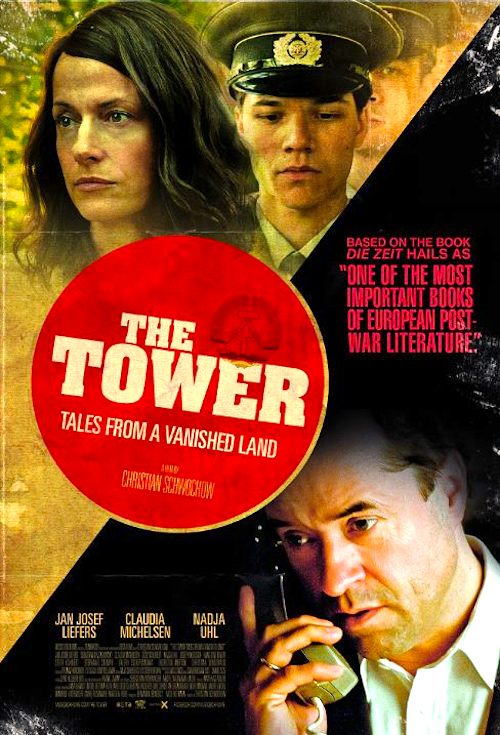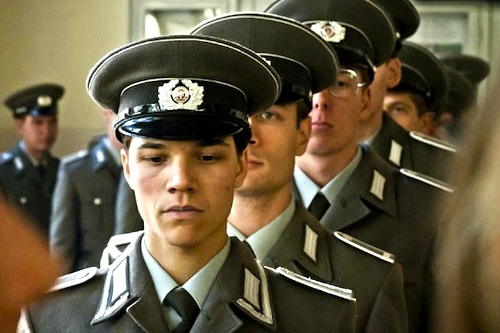 By Joe Bendel. By the 1980s, most East Germans realized if they hadn’t finished building socialism by now, they never would. Dr. Richard Hoffmann sort of got the picture, but there were blind spots in his understanding. For instance, he does not recognize the pleasant—dare we say bourgeoisie—nature of his Dresden “Tower” neighborhood necessarily makes him somewhat suspect. Unfortunately, his son will become intimately acquainted with the GDR’s hypocrisy and vindictiveness in Christian Schwochow’s The Tower, which opens this Friday in New York.
By Joe Bendel. By the 1980s, most East Germans realized if they hadn’t finished building socialism by now, they never would. Dr. Richard Hoffmann sort of got the picture, but there were blind spots in his understanding. For instance, he does not recognize the pleasant—dare we say bourgeoisie—nature of his Dresden “Tower” neighborhood necessarily makes him somewhat suspect. Unfortunately, his son will become intimately acquainted with the GDR’s hypocrisy and vindictiveness in Christian Schwochow’s The Tower, which opens this Friday in New York.
Based on Uwe Tellkamp’s prize-winning novel, The Tower was original produced as a three hour German television mini-series that Music Box Films will release on VOD, along with the two hour (on the dot) American theatrical version. We have only seen the latter, but there are no gaping holes apparent, suggesting they used a scalpel worthy of Dr. Hoffmann at the peak of his powers rather than Harvey Weinstein’s meat cleaver.
Dr. Hoffmann is indeed rather pleased with his situation in 1982. He will be the recipient of a prestigious medical award and is widely seen as the likely successor to the clinic’s fuddy-duddy director. Somehow, he is successfully juggling his career, a family life with his wife Anne and his underachieving son Christian, while secretly keeping house with his mistress Josta Fischer and their illegitimate daughter. However, publically reprimanding an incompetent doctor with close ties to the central committee is not a smart strategy for promotion. In fact, it is the beginning of the end.
Shortly thereafter, Dr. Hoffmann is visited by the Stasi. Out of youthful ideological zeal, he agreed to be an informer during his student days, but tried to forget the old arrangement as he became disillusioned by reality. They now expect him to renew his snitching duties. Of course, the Stasi knows all about his secret life. They also have a damning report he submitted on his best friend and longtime professional colleague. Dr. Hoffmann tries to stall and prevaricate, but his position becomes increasingly sticky when Christian runs into the sort of ideological trouble at school that could permanently ruin his future.
There is something fundamentally appealing about a film that starts with Hoffmann and his cronies stealing Christmas trees literally tagged for privileged Party apparatchiks. While Schwochow largely skips over familiar issues of shortages and privations because of the characters’ relatively well-to-do standing, he vividly portrays the everyday duality of GDR life. Whenever the Hoffmanns need to have a serious discussion, they invite each other for a walk. When they do speak, ostensibly neutral code-words are peppered throughout their discourse.

As the Job-like Dr. Hoffmann undone by a ruthless state and his own moral failings, Dresden-born Jan Josef Liefers is riveting like a car crash. It is a thoroughly grounded performance, but it takes on classically tragic dimensions. Yet, it is Claudia Michelsen who really anchors the film with her quiet authority. Frankly, there is not a lot of room for Streep-ish histrionics in The Tower, because that was an indulgence East Berliners could not afford.
Schwochow actually has two films opening this weekend in New York. West more fully explores the challenges of immigration frequently alluded to in Tower, but the Hoffman family saga has considerably more heft and bite. Both are recommended, but if time only allows for one, it should be The Tower (of course, the fuller VOD cut is probably even better). It takes a hard, honest look at what statism does to people, while pulling audiences into a sweeping Cold War drama. Highly recommended, the theatrical version of The Tower opens this Friday (11/7) in New York at the Cinema Village, whereas West opens at Anthology Film Archives.
LFM GRADE: B+
Posted on November 4th, 2014 at 8:00pm.